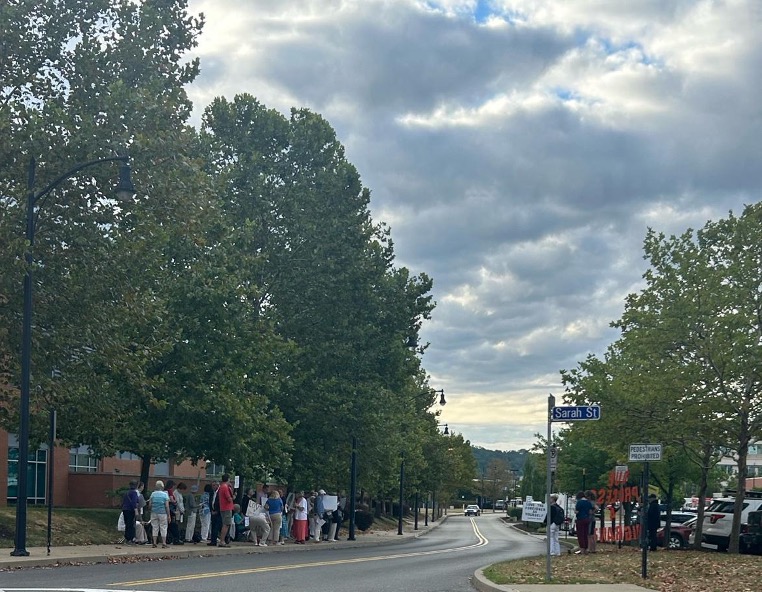By Elica Semnani, Staff Writer

Photo courtesy of Elica Semnani
As I rush to catch my bus early on Friday mornings, I pass by a group walking the opposite way towards Sidney Street. Every Friday without fail, the group is equipped with signs and banners reading “Due Process 4 Immigrants” and “Love the Foreigner as Yourself”.
I quickly learned located on Sidney Street is the U.S. Immigration and Customs Enforcement (ICE) field office, which covers 23 counties, including Allegheny County.
The groups that organize these gatherings are the Pittsburgh Area Pax Christi, Sisters of St. Joseph, and Casa San Jose. They call to the community to join them for their “Prayerful Presence” via Facebook and other social media.[1] As of July 2025, there have been 447 ICE arrests in the Pittsburgh region.[2]
Due process, or the due process of law, is found in the Fifth Amendment of the United States Constitution. It reads “no one shall be ‘deprived of life, liberty or property without due process of law’ by the federal government.”[3] Further, the Fourteenth Amendment extended the obligation of due process to the states. The basis behind this clause is to assure that all levels of the United States government operate within the law to provide fair procedure, “nor deny to any person within its jurisdiction the equal protection of the laws.”[4] This begs the larger question that has been a central issue in recent immigration policies; does due process apply to undocumented immigrants?
Some scholars say that the Fifth Amendment applies to all persons, regardless of their citizenship status.[5] These scholars argue that the language reads “person,” not “citizen.”[6] Moreover, they cite that historically the Supreme Court has ruled that due process applies to everyone in the United States.[7] This was confirmed by the Supreme Court in Wong Wing v. United States, where the Court ruled that the Fifth Amendment includes “all persons within the territorial jurisdiction, without regard to any differences of race, of color, or of nationality.”[8]
Conversely, others interpret that because the removal process is a civil proceeding, reaffirmed by the Supreme Court in Padilla v. Kentucky, due process is inapplicable.[9] Those who interpret due process in this manner argue that since the Supreme Court ruled that removing undocumented individuals does not deprive them of life, liberty, or property, there are no requirements to read Miranda Rights to undocumented people, nor must officers obtain search warrants prior to search and seizure of undocumented people.[10]
What are the goals of this specific group? Peace.[11] A member of the group, Sister Barbara Finch of the Sisters of St. Joseph, told WPXI Channel 11 that “‘[i]t was impending on our heart that we had to do something.’”[12] Sister Barbara also stated the reasoning behind the prayer group is because they found prayer is a less threatening means of advocacy.[13] The group prays for those who have been detained and for ICE agents to show compassion.[14]
[1] https://www.facebook.com/groups/1779987638899383/posts/4167201316844658/
[2] https://www.publicsource.org/resource-guide-to-ice-immigration-enforcement-pittsburgh/
[3] https://www.law.cornell.edu/wex/due_process
[4] https://constitution.congress.gov/browse/essay/amdt14-S1-3/ALDE_00013743/
[5] https://www.americanimmigrationcouncil.org/about-immigration/due-process-and-courts/#:~:text=The%20Constitution%20guarantees%20due%20process,to%20defend%20themselves%20in%20court.
[6] https://www.americanimmigrationcouncil.org/about-immigration/due-process-and-courts/#:~:text=The%20Constitution%20guarantees%20due%20process,to%20defend%20themselves%20in%20court.
[7] Id.
[8] https://www.brennancenter.org/our-work/research-reports/immigration-court-system-explained
[9] https://www.heritage.org/border-security/report/due-process-and-aliens-what-they-are-and-are-not-entitled-immigration
[10] Id.
[11] https://www.wpxi.com/news/local/growing-group-gathers-protest-through-prayer-outside-pittsburghs-ice-office/IRW3EU665NBH7CQDCJEDYV66T4/
[12] Id.
[13] Id.
[14] Id.